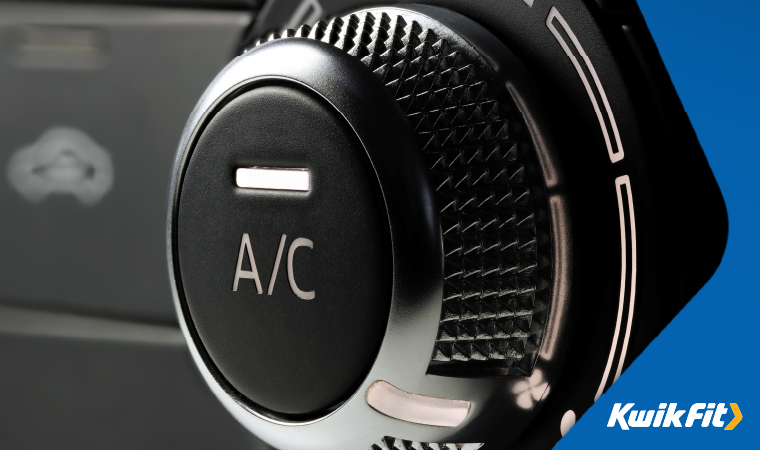What's the Difference Between Air Conditioning & Climate Control?
Jessica Bird | Thursday 19th June 2025 5:32pm

If it’s a hot day or your cabin is feeling too warm, keep your passengers cool with air con… or climate control… or both. See, this is the issue: many people don’t know the difference between the two vehicle cooling systems.
If you’re one of those people, then this blog is for you. If you’re wondering whether climate control is the same as air con, read on for a rundown on what both air con and climate control are, how they work, what the difference between them is, and which is best for you.
What is air conditioning in a car?
Car air conditioning is a vehicle cooling system that circulates cool air within the cab, while using a refrigerant gas to absorb heat and release it outside. Air conditioning is also useful for helping to filter out pollutants like pollen.
The concept of air conditioning inside cars was invented in 1939 by The Packard Motor Company. By the 1970s, almost half of all new cars came with air con pre- installed. Amazingly, the fundamentals of air con remain the same today, with the same main 3 components: the compressor, the condenser, and the evaporator.
How does car air conditioning work?
All three components push refrigerant through a closed-loop system, allowing it to change from a gas to a liquid and back again. This process occurs in the condenser, driven by the compressor attached to the car engine for power.
- The condenser dissipates heat and cools the high-pressure refrigerant gas into a liquid.
- From here, the liquid is stripped of water by the receiver-dryer before entering the thermal expansion valve via a pump.
- Then the liquid is allowed to expand and becomes a low-pressure liquid, in order to enter the evaporator within the vehicle interior.
- The evaporator then turns the refrigerant into a gas, which is blown by a fan into the vehicle.
For a more detailed explanation of the process, read our blog, ‘Everything You Need to Know About Your Car’s Air Con’.
If you’re worried about your air con, book an air conditioning recharge and service or a free air con check with Kwik Fit today.
What is climate control in a car?
Climate control is a car cooling system that allows drivers and passengers to manage the interior temperature of their vehicles with accuracy and precision. Climate control systems automatically maintain a desired cabin temperature and humidity. Compared to air conditioning, climate control is far more sophisticated.
Drivers can select the temperature they require and watch the climate control system automatically alter the rate and amount of cool air entering the vehicle accordingly. Unlike air conditioning, the driver or passengers do not have to manually adjust the airflow every time they feel a change in temperature.
How does car climate control work?
In order for the climate control system to continuously adjust the temperature inside the vehicle, the following happens:
- A number of sensors are used to gauge how hot or cool the air is inside the cabin.
- The information from the sensors is then used to determine how much warm or cool air needs to be pumped into the vehicle to maintain the temperature desired by the users.
- The system is also able to adjust the fan speed and recirculation settings in order to control whether fresh or recirculated air is pumped into the vehicle.
More modern cars may have dual or multi-zone climate control. Multi-zone climate control allows for the temperature of multiple separate zones in the car to be controlled at once. The driver, for instance, could set their own temperature to 17 degrees, while the back seat and passenger area could be warmer at 24 degrees. This is great for particularly quarrelsome passengers, ending sibling feuds over cabin temperatures.

Is climate control the same as air con for cars?
No, air conditioning and climate control are not the same thing — but they are both systems for controlling the temperature within a vehicle. The core differences between car air con and climate control are:
Air conditioning is more simplistic than climate control
While both systems can blow both warm and cool air into a vehicle, only climate control can automatically control a vehicle’s interior temperature. Air conditioning lacks the ability to consistently monitor and maintain air temperature independently of the user’s manual actions.
Climate control is more 'hands-off' than air conditioning
Climate control, on the other hand, is far more intuitive and easy to use, since it requires virtually no manual effort from the user.
Climate control may be safer than air conditioning
In this respect, climate control is safer too, as the concentration wasted on fiddling around with air conditioning settings is redirected onto maintaining a safe position on the road.
Air conditioning is less consistent than climate control
Since air conditioning is less automated, climate control provides a more consistent, comfortable temperature in a vehicle’s cabin. With air con, you are much more likely to need sudden blasts of cold air to cool you down, rather than a steady stream of air at a lower temperature.
Climate control vs. air con: which is right for you?
Different vehicle models will come fitted with different cooling systems. Usually, more modern and expensive models have climate control already installed. If you live in a particularly hot location or spend a lot of time in your car, it might be worth looking into cars with climate control, particularly if you often drive long distances.
The added convenience of not having to adjust the air conditioning can be a big help. What’s more, climate control on your car can make it more attractive when you come to sell it.
That being said, cars with climate control features can be more expensive. So, if you’re on a budget, sticking with a car with well-maintained air con is also a cost-effective way to beat the heat.
Air Con Not Working?
If your air con is giving you trouble - or at least not giving you any relief in a boiling hot car - book your vehicle into your local Kwik Fit centre for a free air con check, debug, or air con regas.
Any facts, figures and prices shown in our blog articles are correct at time of publication.
Featured Articles
Is it Illegal to Drive With One Headlight?
Saturday 19th July 2025
Wondering if it’s illegal to drive with one headlight? Learn about the safety risks and penalties of illegal blown bulbs and why you should fix them promptly.
Air Con in EVs & Hybrids: Experts Answer Your Questions
Monday 30th June 2025
Does air con drain EV batteries? Can you use the air con while charging an electric car? Find out the answers to these questions & more from Kwik Fit’s experts.
Why Is Your Car Making a Noise? Fixes & Tips
Friday 13th June 2025
When your car starts making unexpected noises, it can certainly be quite disconcerting; it may be nothing to worry about, but here’s what you need to know.









